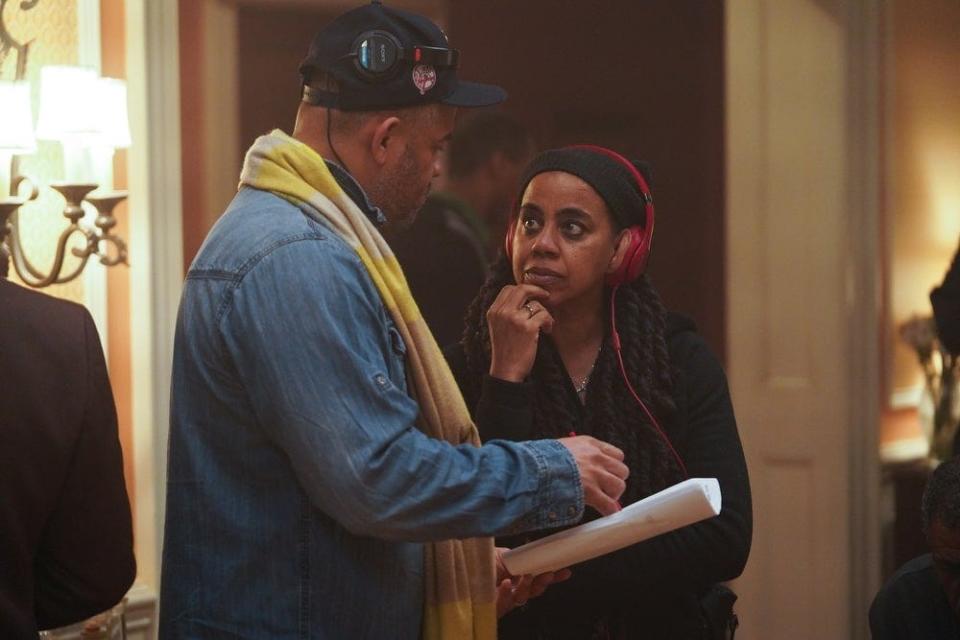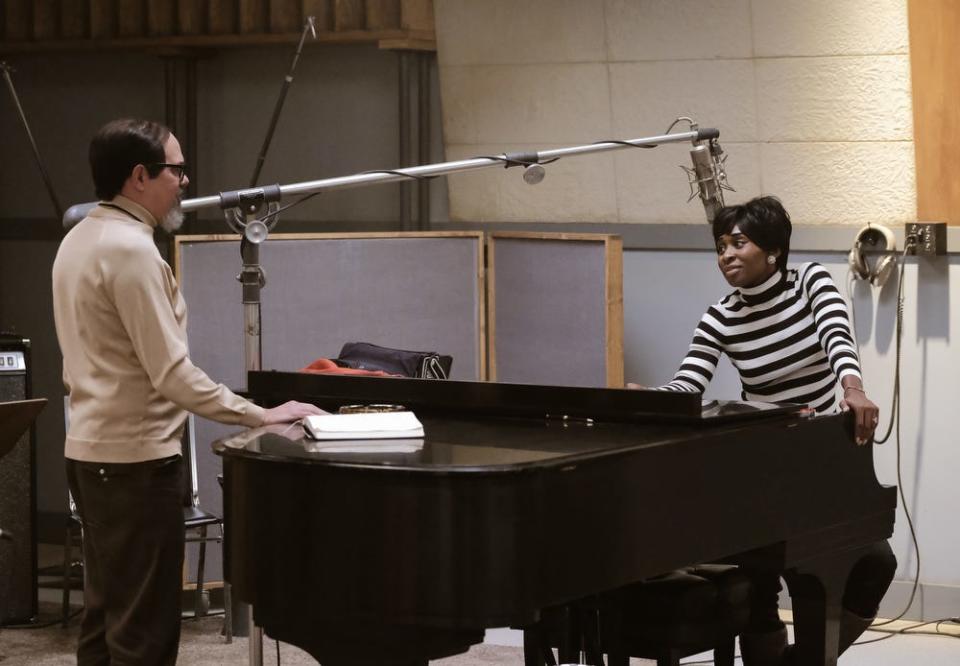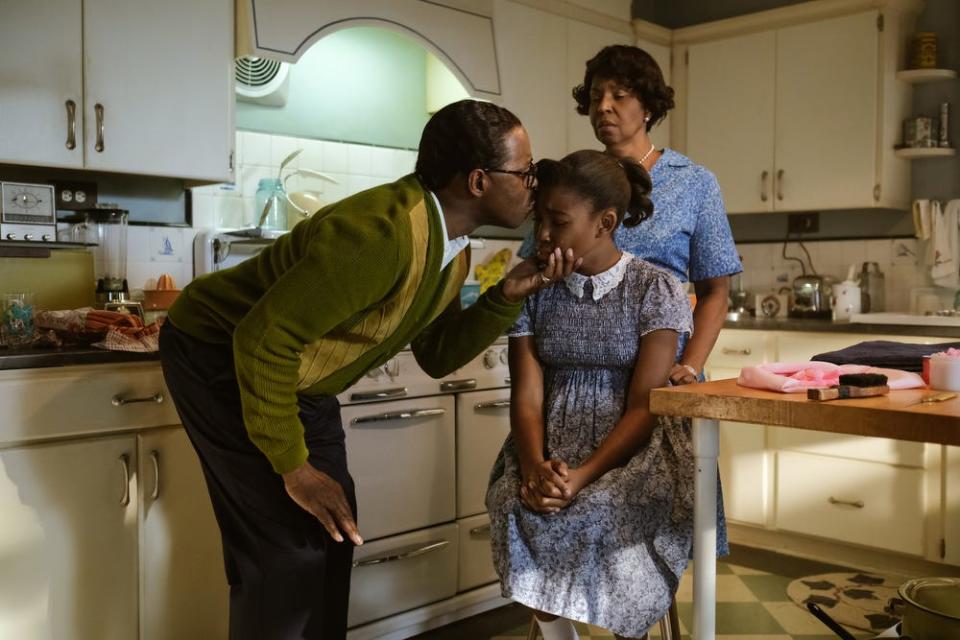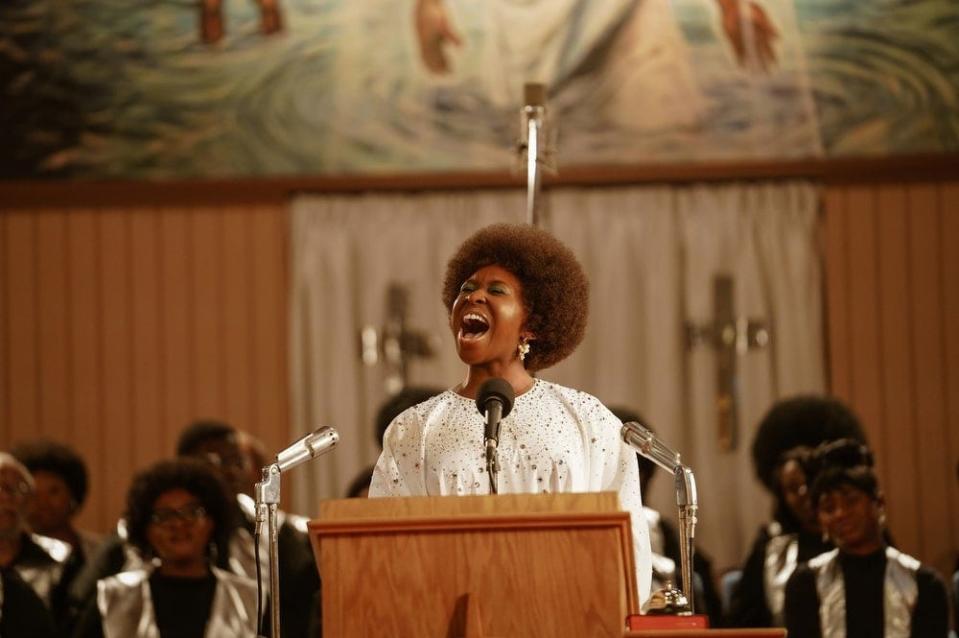Aretha Franklin: Cynthia Erivo on how the legendary 'Genius' comes to life in NatGeo miniseries
- Oops!Something went wrong.Please try again later.
- Oops!Something went wrong.Please try again later.
- Oops!Something went wrong.Please try again later.
For Cynthia Erivo, Aretha Franklin became larger than life during the quiet times.
Traversing decades of Franklin’s life and career as she played the Queen of Soul in National Geographic's “Genius: Aretha” (Sunday through Wednesday, 9 EDT/PDT), Erivo discovered that the late star’s real power emerged as she confronted – and conquered – her offstage challenges.
“There were scenes where you realized the scope of the story you're telling, and the magnitude of the person,” Erivo says. “And for me, that came in the intimate moments.”
Franklin is fascinatingly multifaceted in the eight-part series, also streaming on Hulu. It chronicles Franklin’s rise from a Detroit church to the heights of global acclaim, with a nuanced performance by Erivo and a vigorous one by Courtney B. Vance as the Rev. C.L. Franklin, Aretha’s father.
With the Jennifer Hudson-led “Respect” due in August, it’s the first of two major Queen of Soul projects this year.
“Genius” was shot in Atlanta, with Pulitzer-winning Broadway veteran Suzan-Lori Parks as lead writer. Executive producers include Ron Howard, Clive Davis and Brian Grazer.

'Genius: Aretha: Film gets its world premiere online and at drive-ins ahead of NatGeo debut
More: Draft of 4th Aretha Franklin will emerges, two years after handwritten wills discovered
“Genius” presents an Aretha who’s divinely talented but emotionally complex. She’s an artist driven by pain, especially from tempestuous relationships with men in her life, including her father and her husband-manager Ted White. And she draws inspiration from key women in her childhood, including Dinah Washington, gospel great Clara Ward and her mother, who died when Aretha was young.
When life gets chaotic, music is the dependable haven – in the studio, onstage and in church. Music becomes a place for relief and release, where Franklin and her voice are confident and in command: She directs seasoned musicians. She’s an exacting perfectionist. At one point, she insists a studio piano will have the right tone only with an empty pizza box sitting on top.
Atlantic Records producer Jerry Wexler (David Cross) is seen as a straight shooter whose honesty earns Franklin’s trust, as the young performer morphs from a singer of pop standards into the Queen of Soul.
Even inside that musical safe space, Franklin is creatively restless, constantly questioning. She battles industry hurdles and even her own misgivings as she ventures from gospel to pop to soul to protest music and back again.

“It will help the folks watching to know she was strong, but she wasn’t inhuman,” Parks said. “I wouldn’t say she had fear, but she always had to think about it like, ‘What is this going to take?’"
Detroit is portrayed as Franklin’s other refuge, the home base where family and the familiar offer an escape. Sisters Erma and Carolyn – played by Patrice Covington and Rebecca Naomi Jones – are trusted friends, if occasional rivals. Brother Cecil is a gentle, calming presence.
The series features enough soap-opera drama, retro stylishness and perceptive musical detail to keep it compelling.
With eight hours to dig deep, “Genius” laces its scenes with plenty of true-to-life details. There’s Franklin’s love for home cooking; her distaste for air conditioning and its voice-spoiling effects; the chain-smoking in her 20s; her insistence on professional formality (“Mr.” and “Ms.”); a stack of unpaid bills; and the ever-present onstage purse, containing the cash she demanded upfront to play a gig.
Erivo ably captures Franklin’s complicated personality: Naturally demure, even shy, the soul star was also proud, suffering no fools and asserting her will as needed. When relaxed, she let her funny streak emerge. She could be ruthlessly ambitious, as when bumping sister Carolyn off the 1976 “Sparkle” soundtrack, taking over the Curtis Mayfield project and nabbing a signature hit with “Something He Can Feel.”
Franklin may have been “a princess in a fairy tale,” as one bit of dialogue goes, but “Genius” is no starry-eyed whitewashing. There are incendiary moments and no-holds-barred portrayals of characters such as White, depicted as a boozing abuser and pimp.
Franklin's father is portrayed as magnetic but controlling, a womanizer and abuser who impregnates a young girl and wrecks his marriage with Aretha’s mother. Taking his musically gifted daughter onto the gospel-revival circuit, he’s seen as a negligent caretaker when 12-year-old Aretha becomes pregnant herself.
Parks said the series’ overall intent is respect and love, adding that “as a Black American, my stake in this is very real.” And the reality, she said, is that C.L. Franklin was a great man with demons.

“We’re not going to sanitize them,” Parks said. “We’re not going to make them lily-white just to make the wide-ranging demographic comfortable.”
Vance, born in Detroit in 1960, said he was too young to remember the Franklin family growing up (but he lived down the street from Motown Records). He prepped for the role by immersing himself in a C.L. Franklin biography and studying the preacher’s recorded sermons.
Growing up in a family of Mississippi sharecroppers menaced by segregation, C.L. Franklin had the choice of “pulpit or plow,” Vance said.
“To go from that to the preacher with the million-dollar voice, the most recognizable preacher in the United States, there’s going to be a cost to that transition, without figuring out who you were and how you got there,” Vance said. “There were no psychologists for Black folks to talk to. The people who were most vulnerable were Black children and Black women, and both white and Black men were taking advantage of those groups.”
Einstein, Picasso and Aretha
While spending its time in the nooks and crannies of Franklin’s life, “Genius” heightens her broader cultural significance. You only had to watch this month's Grammy Awards to see her impact: As Beyoncé commanded the stage that night – a Black woman accepting her 28th career win, to become the top female artist in Grammy history – she was basking in a spotlight hoisted by Franklin.
“Aretha set the groundwork for what it was to be a woman in the music business,” Erivo says. “She was trying to carve out space for herself, to show everyone that we are worthy of winning, we are worthy of a celebration.”
Franklin was a pioneering force, Grazer says, who “punctuated the importance and meaning of (R&B), so that it rose above and became what was probably the most important music of our popular culture.”

“Respect,” a Franklin biopic due in August, is the film Franklin sought to make for years, with Hudson as her handpicked star.
Parks is confident "there’s room enough for all of us.”
“I am so proud that this world has such a great appetite for a story about a great Black American woman,” she says. “And if we had 100,000 stories, plays, movies, shows about her, then great.”

Franklin's biggest hits are missing
Many big Franklin hits are absent from "Genius," including “Respect,” “Baby I Love You,” “Think” and “(You Make Me Feel Like) A Natural Woman,” after MGM locked down exclusive rights for much of that music.
“Genius” creators say their show was narrative-driven anyway – with Parks letting the story guide the song choices.
“I didn’t want to make a jukebox movie,” Grazer says. “I mean, I loved ‘Bohemian Rhapsody,’ which had all the hits and was awesome. I was so taken by it. But with Aretha, it just shouldn’t be boxed up like that.”
Both projects have been attacked by Franklin’s youngest son, Kelf Franklin, who says they moved forward without the family’s involvement.
Grazer said those kinds of wrinkles come with the territory. He cites similar experiences with other true-life projects in his career, including “Friday Night Lights,” “Apollo 13” and “A Beautiful Mind.”
“They’re always very, very complicated," he says. "There’s always a lot of excitement: ‘Let’s do it, let’s do it!’ And then often there’s a shift in the trust."
In a Wednesday statement, National Geographic acknowledged the pushback from parts of the Franklin family:
"We received the message from the family, we hear them and acknowledge their concern for Ms. Franklin's legacy. We think we have a shared goal here – to honor and celebrate the life and legacy of Aretha Franklin. We can tell you that everyone who worked on 'Genius: Aretha' approached telling her story with the intention to respect Ms. Franklin in every aspect of the series and in every decision we made."
For Parks, who was once approached by Franklin to create a stage show about her life, the spirit in "Genius" was ultimately positive and uplifting – and a chance to make a superstar very human. In that way, it was "a really joyous" project.
"I take my sisterhood very seriously," Parks says. "I was so happy I was made part of this because, great: I get to put respect on Aretha Franklin's name and show how she demonstrated her genius. Everybody on the team was all about respect and love for Aretha."
This article originally appeared on Detroit Free Press: Aretha Franklin: Legendary 'Genius' comes to life on NatGeo

